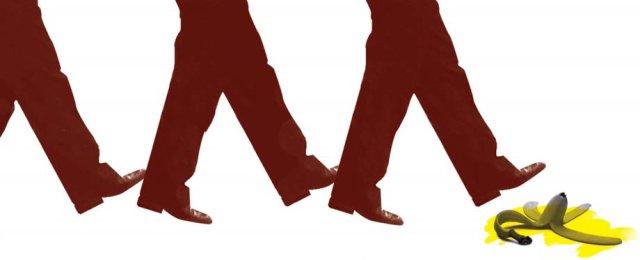You know it don’t come easy

Any successful business has faced pitfalls along the way, but for entrepreneurs and small-to-medium sized companies, these mistakes can prove fatal. Those who have survived tell us their story.
By Hugh Ashton
Ringo Starr sang “You Know It Don’t Come Easy” in 1970. Nearly forty years later and many entrepreneurs are probably nodding their head in agreement. The four entrepreneurs featured here have all had their share of hurdles to jump—some, as they readily admit, were ones that they could have avoided with a little forethought and preparation, and some which were completely unexpected and out of anyone’s control.
 Jim Weisser
Jim Weisser
Rising from (other people’s) ashes
For Jim Weisser, telecommunications expert, President and CEO of PBXL, the banana skins in his career came way before he started as an entrepreneur. Working for PSINet, and then for Enron, some might consider him lucky to have escaped unscathed after the spectacular collapse of both these major corporations. However, his experiences at Enron, where he had worked as a bandwidth trader in Japan (he lost his job through the closure of his unit a month before the HQ flameout), acted as a springboard for him to start his new business. He noticed huge gaps between the inter-telecom carrier service provision and the way in which such services were purchased by enterprises.
He started with a consultancy service providing analysis for corporate telecommunications costs, allowing clients to slash their budgets in this area. Weisser outlines his first mistake as an independent entity: “Although we had set milestones, we had no formal client sign-off process.” In this case, although the deal ended amicably enough, the client’s management changed after completion of the project (but prior to payment of a performance bonus), and the new leadership questioned the previous management’s agreements with Weisser. The importance of such documentation in project management (as well as in back-office operations) became clear, as Weisser continued to attract business, with his cost reduction programs saving clients hundreds of thousands of dollars annually. He decided to move into a new area after “one of our clients spent those savings on a disaster recovery PBX, which they would use only three or four times each year, helping me realize there was a better, more cost-effective way to deliver telecom services to enterprises.”
His newer enterprise, PBXL, provides outsourced offsite Cisco PBX solutions, which operate alongside the consultancy. Employing 10 people, one key change learned through experience occurred at the start of this year: “Typically, quotations for telecom systems include tiny items such as wire interconnects and so on, and customers’ eyes just glaze over. We decided to change this, and sell a service to the business, not a box to the technologists.” The results so far have been encouraging, with customers selecting from plans providing non-threatening explanations of business benefits, rather than having to wade through pages of technical gobbledygook.
 Patrick Oancia
Patrick Oancia
Get it in writing
For Patrick Oancia, the founder and Director of YogaJaya, a yoga training and personal lifestyle brand, one key problem has been the often vague nature of Japanese business dealings. His initial studio was housed in premises where the rental agreement was secured on a handshake. Although it was widely rumored that the building in which he operated was to be redeveloped, when the ax fell, he was given only one month’s formal notice to quit. Lawyers advised him that no legal redress was possible, and the studio had to close its doors at that location (Oancia emphasizes that the parting, although abrupt, was amicable). However, Oancia says he developed a sixth-sense for what was going on. “An essential gift for an entrepreneur in Japan is to understand what is not being said,” he explains. He opened alternative premises, where he and his 14 instructors and four administrative staff could meet the needs of their 7,000 registered students.
An essential gift for an entrepreneur in Japan is to understand what is not being said”
The imprecise nature of some Japanese rules and regulations also irks Oancia. He feels that visa regulations should be normalized, so the rules applying to the extended visas he sees awarded to some entrepreneurs should be applied to all, rather than being applied according to what seems at times to be individual whims. After receiving so many contradictory answers from different officials, another area where he feels that Japan needs to lay down more hard and fast rules is that of taxation. Despite these problems, Oancia’s vision of yoga as a marketable Japan lifestyle enhancer seems to be doing well, but as he points out, it is necessary to be very aware of potential invisible pitfalls at every stage.
 Brian Tannura
Brian Tannura
Hello Kitty: not just for kids
Brian Tannura created Market Pioneer Japan Inc to implement the successful import and distribution of certain vending machines to Japan which would otherwise never have made it here. However, as Tannura freely admits, there have been some hiccups along the way. The first came when he imported a talking gumball machine which refused to talk properly to its customers when operated in Osaka, but worked in Tokyo. The answer to this problem, he found after questioning over 20 people, lay in Japan’s dual-frequency AC power supply—60Hz in one part of the country, and 50Hz in the other. More seriously, there were issues with the costs of transport and delivery of these heavy bulky objects that he had not factored into his original cost plans. One extra item which came as a culture shock was the cost of disposing unwanted machines. “At home,” he explains, “the same machine in the corner of the supermarket that I remembered as a kid was still there ten, fifteen years later. In Japan, half a year is a long time for a machine to be in place—and it costs money to haul away the unwanted machines.”
These unexpected bumps in the road did not prevent him from persevering with the business, and he now concentrates on so-called “flat media vendors.” They are eco-friendly because they use no electricity and require little maintenance or attention. They can also generate over US$1,000 per week each in gross revenue, selling character stickers and labels and a new line which sells well in summer: temporary tattoos. Two thousand machines are currently installed nationwide, and the market ranges from the expected elementary schoolchildren to women in their 20s. With partnerships with major toy manufacturers now in progress, he believes that the number of machines could double annually, at least for the next few years.
He spends much of his time trying to forsee the next big thing in this area, assisted by the character owners, who provide advance warning of what is on the horizon. Tannura feels the business is now too large for one person alone, despite the fact that many of his sales are now made on commission by independent salesmen, and his office infrastructure is outsourced. His latest venture is the introduction of a high-tech snack vendor for Japanese office locations which he hopes will take its place as a fixture in Japanese offices.
 Holger Karas
Holger Karas
Success is in the genes
Biobase is at the other end of the entrepreneurial scale, with offices in Germany (where the company originated), the USA, Japan, and India—but has seen its share of rocks in the road. Holger Karas, coming from an academic background, co-founded the company in 1997 to develop and sell databases of genetic information patterns to pharmaceutical companies, following an earlier IT venture from which he says he learned the lesson “keep a close eye on the money” (the CEO of this previous venture skimmed the profits).
"keep a close eye on the money (the CEO of this previous venture skimmed the profits)."
After a ¥3 million initial investment, a second round of financing was expected, but this dried up as a result of the final collapse of the dot-com bubble and the events of September 11, 2001. With the clock ticking, Karas and the other directors spent four solid days phoning round the world to anyone who might help. The white knight came from Japan, in the shape of a company willing to inject cash into the ailing start-up. After a few boardroom reshuffles, the company is now well-placed, with its product selling to 18 of the world’s top 20 and 15 of the top 20 Japanese pharmaceutical companies.
Karas’s message: “Have a real product in mind and work towards that goal.” He points to a one-time rival, which attracted many times the value of venture capital than did Biobase, and crashed and burned a few years ago because, in his opinion, the company was being driven by a vaguely defined goal rather than a clearly delineated product.
Conclusion
If there is a moral to these stories, it may be found in the lyrics of another Beatles track, ‘Helter Skelter’: “When I get to the bottom I go back to the top”—exactly what the four entrepreneurs here have done. JI





